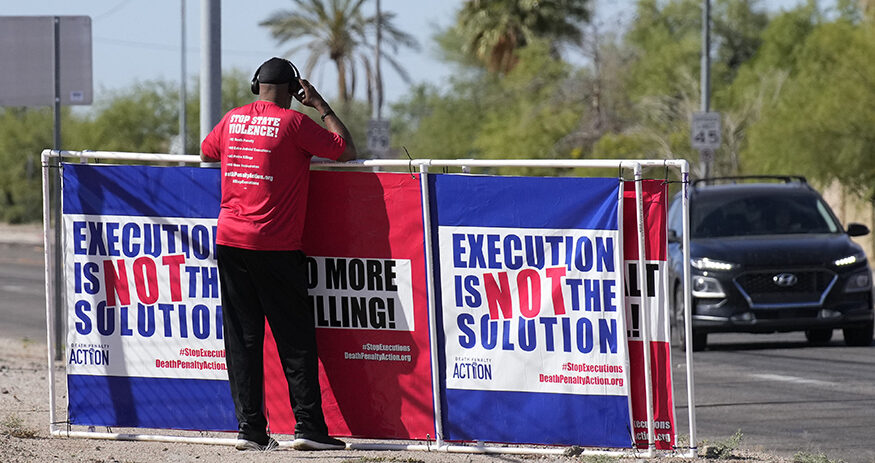Arizona moves one step closer to first execution in 2 years
Howard Fischer, Capitol Media Services//December 6, 2024//[read_meter]
Arizona moves one step closer to first execution in 2 years
Howard Fischer, Capitol Media Services//December 6, 2024//[read_meter]
Attorney General Kris Mayes took the first steps Friday to finally putting convicted murderer Aaron Gunches to death.
Mayes asked the Arizona Supreme Court to set a “firm briefing schedule” to deal with the legal issues required before an inmate can be executed.
Strictly speaking, she has not yet asked for the necessary warrant of execution. That, Mayes said, will not come until after any legal arguments have been heard.

The reason for that is that an execution has to occur exactly 35 days after a warrant is issued. More to the point, if there are still pending legal issues, the warrant expires.
That’s exactly what happened last year.
Gunches was convicted and sentenced to death for the 2002 murder of Ted Price, his girlfriend’s ex husband. He had been set to be put to death on April 6, 2023.
That never occurred after Gov. Katie Hobbs said in January 2023 she did not want any executions to be carried out while she had a special commissioner study the process in the wake of several “botched” executions. Mayes concurred and the warrant expired.
The governor last month agreed to restart the process after she dismissed retired federal Magistrate David Duncan, whom she had hired to do the study. Hobbs said that she had lost confidence in him, saying a draft report he prepared showed he had gone far afield of what she said was a limited request that he review the protocols and procedures used to put inmates to death.
But there also is another reason Mayes is not yet asking the court to sign the death warrant.
In her new court filings, she pointed out that the pentobarbital the state plans to use to execute Gunches has to be compounded. More to the point, it must be used within 90 days of that occurring.
Mayes said she is now ready to restart the execution process.
“This is not a decision that I have made lightly,” she said in a prepared statement.
“But the death penalty is the law in our state and it is my job to uphold it,” Mayes continued. “The family of Ted Price has waited for over 22 years for justice in this case, and I am committed to ensuring that justice is served.”
How quickly an execution could occur remains unclear.
Mayes told the justices that Gunches, who has been representing himself, has 10 days to respond to the request for a warrant of execution, with the state having five days to respond.
On paper, the court then could immediately review the request and, if granted, set an execution date for 35 days later. The attorney general said, however, she doesn’t expect such quick action.
“When extended filing periods are requested, as frequently occurs in capital cases, the pre-warrant briefing process alone, not including the statutory 35-day waiting period on the execution warrant, can last for months,” Mayes told the court.
For example, she said, the pre-warrant litigation for Robert Jones in 2013 spanned approximately two months.
But she also noted that the execution date was set for beyond the 35-day period, likely because there was another pending execution. The result, she said, was nearly four months elapsing between the state’s request for the warrant and Jones’ execution.
Whether Gunches, who represents himself, will contest the warrant remains unclear.
Gunches never disputed the charges, pleading guilty to both the murder and kidnapping of Price.
He waived his right to post-conviction review and in November 2022 filed a motion on his own behalf seeking an execution warrant. But Gunches withdrew that request in January 2023 after Hobbs took office.
The Supreme Court refused at that time to reconsider. But with the decision to halt all executions during the Hobbs-ordered study, the warrant expired. And, until now, Mayes had refused to seek a new one.
If the execution goes forward, it would be the first in two years.
There are 111 inmates on death row, with 25 who, including Gunches, have exhausted their appeals.
Arizona, under Republican former Attorney General Mark Brnovich, resumed executions in 2022 after an eight-year pause following the botched procedure when Joseph Wood was given 15 doses of a two-drug cocktail over two hours. Two other inmates were put to death that year.
But Hobbs, in appointing Duncan shortly after she took office in 2023, said the process remained plagued by questions.
“Recent executions have been embroiled in controversy,” she said at the time. There were reports that prison employees repeatedly encountered problems in placing the intravenous line into the veins of the condemned men.
Still, halting executions actually was not the governor’s decision to make.
It is solely up to the attorney general to ask the Arizona Supreme Court for the necessary warrant to execute someone once all appeals are exhausted. And unlike in some states, the governor here cannot unilaterally pardon someone or commute a sentence without first getting a recommendation to do so from the Arizona Board of Executive Clemency.
But Mayes, in legal filings with the Supreme Court last year, agreed with Hobbs that the delay was justified, which is why she refused until now to seek any execution warrants.
“There is a heightened need to ensure any capital sentence is carried out constitutionally, legally, humanely, and with transparency,’’ she told the justices.
While Hobbs dismissed Duncan and he never issued a final report, Mayes said she was satisfied with a separate review of the execution process issued by Ryan Thornell, director of the Department of Corrections, Rehabilitation and Reentry.
Mayes’ legal filings come as the Supreme Court is weighing a parallel bid by Maricopa County Attorney Rachel Mitchell to get an order to put Gunches to death.
Mitchell disagreed with the decision by Hobbs and Mayes to delay all executions during the outside review, one that the governor has since abandoned. So she contends she has the same right as the attorney general to seek a death warrant.
The justices have not yet ruled on that argument.
A spokeswoman for Mitchell said Friday said it’s too soon to know if Mitchell will now drop her claim.


















